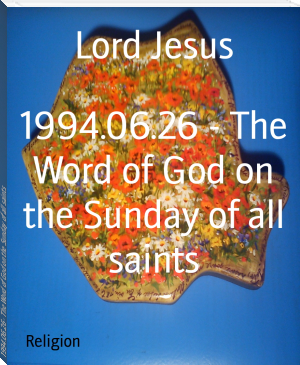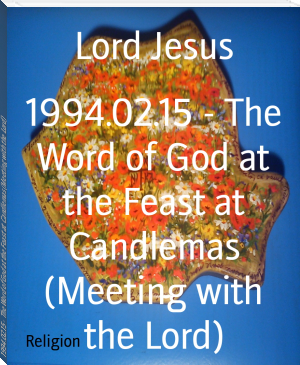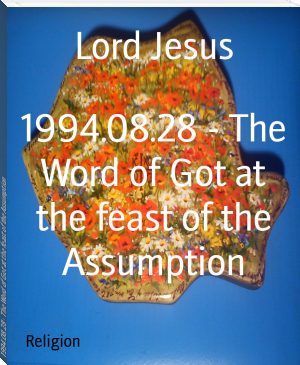Orthodoxy - G. K. Chesterton (books to read to get smarter .TXT) 📗

- Author: G. K. Chesterton
- Performer: -
Book online «Orthodoxy - G. K. Chesterton (books to read to get smarter .TXT) 📗». Author G. K. Chesterton
But according to orthodox Christianity this separation between God and man is sacred, because this is eternal. That a man may love God it is necessary that there should be not only a God to be loved, but a man to love him. All those vague theosophical minds for whom the universe is an immense melting-pot are exactly the minds which shrink instinctively from that earthquake saying of our Gospels, which declare that the Son of God came not with peace but with a sundering sword. The saying rings entirely true even considered as what it obviously is; the statement that any man who preaches real love is bound to beget hate. It is as true of democratic fraternity as a divine love; sham love ends in compromise and common philosophy; but real love has always ended in bloodshed. Yet there is another and yet more awful truth behind the obvious meaning of this utterance of our Lord. According to Himself the Son was a sword separating brother and brother that they should for an aeon hate each other.
But the Father also was a sword, which in the black beginning separated brother and brother, so that they should love each other at last.
This is the meaning of that almost insane happiness in the eyes of the mediaeval saint in the picture. This is the meaning of the sealed eyes of the superb Buddhist image. The Christian saint is happy because he has verily been cut off from the world; he is separate from things and is staring at them in astonishment.
But why should the Buddhist saint be astonished at things?—
since there is really only one thing, and that being impersonal can hardly be astonished at itself. There have been many pantheist poems suggesting wonder, but no really successful ones. The pantheist cannot wonder, for he cannot praise God or praise anything as really distinct from himself. Our immediate business here, however, is with the effect of this Christian admiration (which strikes outwards, towards a deity distinct from the worshipper) upon the general need for ethical activity and social reform. And surely its effect is sufficiently obvious. There is no real possibility of getting out of pantheism, any special impulse to moral action.
For pantheism implies in its nature that one thing is as good as another; whereas action implies in its nature that one thing is greatly preferable to another. Swinburne in the high summer of his scepticism tried in vain to wrestle with this difficulty.
In “Songs before Sunrise,” written under the inspiration of Garibaldi and the revolt of Italy he proclaimed the newer religion and the purer God which should wither up all the priests of the world: “What doest thou now Looking Godward to cry I am I, thou art thou, I am low, thou art high, I am thou that thou seekest to find him, find thou but thyself, thou art I.”
Of which the immediate and evident deduction is that tyrants are as much the sons of God as Garibaldis; and that King Bomba of Naples having, with the utmost success, “found himself”
is identical with the ultimate good in all things. The truth is that the western energy that dethrones tyrants has been directly due to the western theology that says “I am I, thou art thou.”
The same spiritual separation which looked up and saw a good king in the universe looked up and saw a bad king in Naples. The worshippers of Bomba’s god dethroned Bomba. The worshippers of Swinburne’s god have covered Asia for centuries and have never dethroned a tyrant.
The Indian saint may reasonably shut his eyes because he is looking at that which is I and Thou and We and They and It.
It is a rational occupation: but it is not true in theory and not true in fact that it helps the Indian to keep an eye on Lord Curzon.
That external vigilance which has always been the mark of Christianity (the command that we should WATCH and pray) has expressed itself both in typical western orthodoxy and in typical western politics: but both depend on the idea of a divinity transcendent, different from ourselves, a deity that disappears. Certainly the most sagacious creeds may suggest that we should pursue God into deeper and deeper rings of the labyrinth of our own ego. But only we of Christendom have said that we should hunt God like an eagle upon the mountains: and we have killed all monsters in the chase.
Here again, therefore, we find that in so far as we value democracy and the self-renewing energies of the west, we are much more likely to find them in the old theology than the new.
If we want reform, we must adhere to orthodoxy: especially in this matter (so much disputed in the counsels of Mr. R.J.Campbell), the matter of insisting on the immanent or the transcendent deity.
By insisting specially on the immanence of God we get introspection, self-isolation, quietism, social indifference—Tibet. By insisting specially on the transcendence of God we get wonder, curiosity, moral and political adventure, righteous indignation—Christendom.
Insisting that God is inside man, man is always inside himself.
By insisting that God transcends man, man has transcended himself.
If we take any other doctrine that has been called old-fashioned we shall find the case the same. It is the same, for instance, in the deep matter of the Trinity. Unitarians (a sect never to be mentioned without a special respect for their distinguished intellectual dignity and high intellectual honour) are often reformers by the accident that throws so many small sects into such an attitude.
But there is nothing in the least liberal or akin to reform in the substitution of pure monotheism for the Trinity. The complex God of the Athanasian Creed may be an enigma for the intellect; but He is far less likely to gather the mystery and cruelty of a Sultan than the lonely god of Omar or Mahomet. The god who is a mere awful unity is not only a king but an Eastern king.
The HEART of humanity, especially of European humanity, is certainly much more satisfied by the strange hints and symbols that gather round the Trinitarian idea, the image of a council at which mercy pleads as well as justice, the conception of a sort of liberty and variety existing even in the inmost chamber of the world.
For Western religion has always felt keenly the idea “it is not well for man to be alone.” The social instinct asserted itself everywhere as when the Eastern idea of hermits was practically expelled by the Western idea of monks. So even asceticism became brotherly; and the Trappists were sociable even when they were silent.
If this love of a living complexity be our test, it is certainly healthier to have the Trinitarian religion than the Unitarian.
For to us Trinitarians (if I may say it with reverence)—to us God Himself is a society. It is indeed a fathomless mystery of theology, and even if I were theologian enough to deal with it directly, it would not be relevant to do so here. Suffice it to say here that this triple enigma is as comforting as wine and open as an English fireside; that this thing that bewilders the intellect utterly quiets the heart: but out of the desert, from the dry places and the dreadful suns, come the cruel children of the lonely God; the real Unitarians who with scimitar in hand have laid waste the world. For it is not well for God to be alone.
Again, the same is true of that difficult matter of the danger of the soul, which has unsettled so many just minds. To hope for all souls is imperative; and it is quite tenable that their salvation is inevitable. It is tenable, but it is not specially favourable to activity or progress. Our fighting and creative society ought rather to insist on the danger of everybody, on the fact that every man is hanging by a thread or clinging to a precipice.
To say that all will be well anyhow is a comprehensible remark: but it cannot be called the blast of a trumpet. Europe ought rather to emphasize possible perdition; and Europe always has emphasized it.
Here its highest religion is at one with all its cheapest romances.
To the Buddhist or the eastern fatalist existence is a science or a plan, which must end up in a certain way. But to a Christian existence is a STORY, which may end up in any way. In a thrilling novel (that purely Christian product) the hero is not eaten by cannibals; but it is essential to the existence of the thrill that he MIGHT be eaten by cannibals. The hero must (so to speak) be an eatable hero. So Christian morals have always said to the man, not that he would lose his soul, but that he must take care that he didn’t. In Christian morals, in short, it is wicked to call a man “damned”: but it is strictly religious and philosophic to call him damnable.
All Christianity concentrates on the man at the crossroads.
The vast and shallow philosophies, the huge syntheses of humbug, all talk about ages and evolution and ultimate developments.
The true philosophy is concerned with the instant. Will a man take this road or that?—that is the only thing to think about, if you enjoy thinking. The aeons are easy enough to think about, any one can think about them. The instant is really awful: and it is because our religion has intensely felt the instant, that it has in literature dealt much with battle and in theology dealt much with hell. It is full of DANGER, like a boy’s book: it is at an immortal crisis. There is a great deal of real similarity between popular fiction and the religion of the western people.
If you say that popular fiction is vulgar and tawdry, you only say what the dreary and well-informed say also about the images in the Catholic churches. Life (according to the faith) is very like a serial story in a magazine: life ends with the promise (or menace) “to be continued in our next.” Also, with a noble vulgarity, life imitates the serial and leaves off at the exciting moment.
For death is distinctly an exciting moment.
But the point is that a story is exciting because it has in it so strong an element of will, of what theology calls freewill.
You cannot finish a sum how you like. But you can finish a story how you like. When somebody discovered the Differential Calculus there was only one Differential Calculus he could discover.
But when Shakespeare killed Romeo he might have married him to Juliet’s old nurse if he had felt inclined. And Christendom has excelled in the narrative romance exactly because it has insisted on the theological freewill. It is a large matter and too much to one side of the road to be discussed adequately here; but this is the real objection to that torrent of modern talk about treating crime as disease, about making a prison merely a hygienic environment like a hospital, of healing sin by slow scientific methods.
The fallacy of the whole thing is that evil is a matter of active choice whereas disease is not. If you say that you are going to cure a profligate as you cure an asthmatic, my cheap and obvious answer is, “Produce the people who want to be asthmatics as many people want to be profligates.” A man may lie still and be cured of a malady.
But he must not lie still if he wants to be cured of





Comments (0)